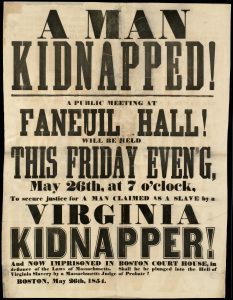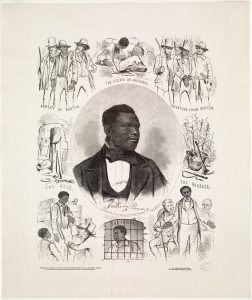This week marks the 166th anniversary of one of the most dramatic sequences of events relating to slavery and abolition in Boston’s history.
On May 24, 1854, escaped slave Anthony Burns was arrested by Federal agents, ostensibly for robbery, but in fact to return him to his ‘owner’ under the Fugitive Slave Act.
After an unsuccessful attempt to free Burns from imprisonment on May 26, a declaration of martial law and intervention by President Franklin Pierce ensured that Burns would be tried.
On June 1 Judge Edward G. Loring ordered that Burns be returned to his ‘owner,’ and the next day thousands of Bostonians lined the streets in lamentation as Burns was led to the ship that would return him to enslavement.
But his story had a happy ending. Boston abolitionists raised money to buy his freedom, and by February 1855 he returned to Boston a free man.
 Learn more about Anthony Burns and the extraordinary events surrounding his trial with some of these online resources from the Boston Public Library:
Learn more about Anthony Burns and the extraordinary events surrounding his trial with some of these online resources from the Boston Public Library:
- See reproductions of original art, broadsides, and letters regarding Anthony Burns and his case, digitized from the Special Collections of the Boston Public Library and available on Digital Commonwealth (and for some more primary source reproductions, take a look at the documents and bills from the City of Boston Archives collection that were posted in 2017 and 2018).
- Read contemporary newspaper coverage of the case using 19th Century US Newspapers.
- Find biographical articles on Anthony Burns from the Encyclopedia of African-American Culture and History (available through Gale Virtual Reference Library) and The Underground Railroad: An Encyclopedia of People, Places, and Operations (available through Credo Reference).
- Find reproductions of contemporary books, pamphlets, and other primary sources in the Gale Slavery and Anti-Slavery collection, as well as in HeinOnline’s Slavery in America and the World: History, Culture, & Law, which also includes periodical articles, book chapters, and other secondary sources.
- Find scholarly journal articles and book reviews relating to the case through JSTOR.
And to learn more about the history and influence of slavery in the United States generally, explore one of the lists below as an entry to the multitude of eBooks available through the BPL:
- Slavery's Orbit: 18 eBooks on its Scope and Influence
- Slavery and Historical Agency: 12 Online Titles on Resistance and Revolt
- Slave Societies and Cultures: 9 Online Works
- Slave Narratives: 19 Individual Narratives Available as eBooks
- Slave Narratives: 14 Collections and Interpretations Available as eBooks



Add a comment to: Remembering Anthony Burns